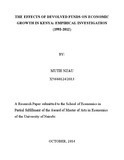| dc.description.abstract | The impact of fiscal decentralization on economic growth is a widely debated topic in economic
literature. Economists such as Oates (1972) are of the view that fiscal decentralization improves
the efficiency of the public sector and it leads to economic growth.
This study analyses the effects of fiscal decentralization with a special focus on decentralized
funds on the growth of the Kenyan economy and is based on time series annual data covering the
period 1993 -2012. The study has been prompted by conflicting findings from previous studies.
The measure of fiscal decentralization that was used in the model is devolved finance
(disintegrated in terms of capital finance and recurrent finance).
Ordinary Least Square Method was applied to estimate the parameters of the model. The results
show that the variations in economic growth over the study period are sufficiently explained by
the variables in the model. Regression results indicate that both decentralized capital finance and
decentralized recurrent finance contributes negatively to growth. However; the coefficient of
decentralized capital finance is negative but statistically significant considering its t-ratio while
the coefficient of decentralized recurrent finance is negative and statistically weak given its tratio.
This implies that the contribution of devolved funds to economic growth was insignificant
during the period under review.
The present study incorporates total government expenditure, trade openness and inflation as
control variables. The study has found out that inflation rate has negative and highly significant
effect on economic growth. High inflation reduces the efficiency of investments and as such
retards economic growth due to high cost of production. The coefficient of total government
expenditure was found to be positive and highly significant confirming Wagner’s law. The
coefficient of trade openness was found to be positive and significant considering its strong tratio
implying that Kenya’s openness to external trade contributed positively and significantly to
economic growth of the country during the study period.
It is highly recommended that a constitutional amendment should be done to give counties more
taxation powers to improve their internal revenue base. Once this is done, it will reduce the
overdependence on the national government by the sub-national governments. Measures should
be put in place to open up trade to the rest of the world. Equally important, the government
should come up with strategies of controlling the rate of inflation in the country.
It was observed that majority of the devolved funds are matching/conditional grants and as such subnational
governments can do very little to allocate funds to key priority areas within their jurisdictions. A
notable example of such conditional grants is the Constituency Development Fund (CDF) which is
allocated to constituencies with a pre-determined formula on how to spend the funds neglecting specific
needs and priorities in specific areas. As such, it is highly recommended that allocations to counties (subnational
governments) be in the form of unconditional grants. | en_US |

